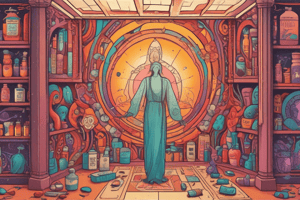Podcast
Questions and Answers
Which of the following most accurately describes the primary mechanism of action for first-generation antipsychotics?
Which of the following most accurately describes the primary mechanism of action for first-generation antipsychotics?
- Blocking dopamine D2 receptors (correct)
- Blocking serotonin receptors
- Enhancing glutamate activity
- Inhibiting norepinephrine uptake
What is a common adverse effect associated with second-generation antipsychotics that is less frequently seen with first-generation antipsychotics?
What is a common adverse effect associated with second-generation antipsychotics that is less frequently seen with first-generation antipsychotics?
- Weight gain (correct)
- Parkinsonism
- Neuroleptic malignant syndrome
- Dystonia
What is the most serious potential side effect associated with clozapine that requires regular monitoring?
What is the most serious potential side effect associated with clozapine that requires regular monitoring?
- Agranulocytosis (correct)
- Tardive dyskinesia
- Photosensitivity
- Sedation
Which of the following is considered an adverse effect of monoamine oxidase inhibitors (MAOIs)?
Which of the following is considered an adverse effect of monoamine oxidase inhibitors (MAOIs)?
Which of the following antidepressants typically shows initial improvement in 1-8 weeks but may take up to 12 weeks for maximum response?
Which of the following antidepressants typically shows initial improvement in 1-8 weeks but may take up to 12 weeks for maximum response?
Which extrapyramidal symptom is characterized by an inability to sit still and can occur within days to weeks of starting treatment?
Which extrapyramidal symptom is characterized by an inability to sit still and can occur within days to weeks of starting treatment?
What risk should be carefully weighed when prescribing pharmacotherapy to pregnant patients?
What risk should be carefully weighed when prescribing pharmacotherapy to pregnant patients?
Which mood stabilizer is typically used to prevent manic and depressive episodes in patients with bipolar disorder?
Which mood stabilizer is typically used to prevent manic and depressive episodes in patients with bipolar disorder?
What adverse effect is specifically related to first-generation antipsychotics and can occur months to years after treatment initiation?
What adverse effect is specifically related to first-generation antipsychotics and can occur months to years after treatment initiation?
Which class of antidepressants is known for similar efficacy as SSRIs but has specific dietary restrictions due to the risk of hypertensive crisis?
Which class of antidepressants is known for similar efficacy as SSRIs but has specific dietary restrictions due to the risk of hypertensive crisis?
Which neurotransmitter is primarily associated with muscle action and memory?
Which neurotransmitter is primarily associated with muscle action and memory?
Which of the following correctly describes the resting potential of a neuron?
Which of the following correctly describes the resting potential of a neuron?
What occurs first when an action potential reaches the axon terminal?
What occurs first when an action potential reaches the axon terminal?
What is a common positive symptom of schizophrenia?
What is a common positive symptom of schizophrenia?
Which is a characteristic of Major Depressive Disorder?
Which is a characteristic of Major Depressive Disorder?
Which neurotransmitter is primarily involved in mood regulation and is typically inhibitory?
Which neurotransmitter is primarily involved in mood regulation and is typically inhibitory?
In which mood disorder do individuals experience alternating periods of manic and depressive states?
In which mood disorder do individuals experience alternating periods of manic and depressive states?
What is the role of glutamate in the nervous system?
What is the role of glutamate in the nervous system?
Which neurotransmitter is most closely associated with feelings of pleasure and reward?
Which neurotransmitter is most closely associated with feelings of pleasure and reward?
What is a common characteristic of Obsessive Compulsive Disorder (OCD)?
What is a common characteristic of Obsessive Compulsive Disorder (OCD)?
Flashcards
First-generation antipsychotics (FGAs)
First-generation antipsychotics (FGAs)
A class of antipsychotic medications introduced in the 1960s, primarily blocking dopamine D2 receptors to treat psychosis.
Extrapyramidal symptoms (EPS)
Extrapyramidal symptoms (EPS)
Unwanted movement or muscle-related side effects caused by antipsychotic drugs.
Akathisia
Akathisia
A restlessness and inability to sit still, a type of EPS caused by antipsychotic medications.
Neuroleptic malignant syndrome (NMS)
Neuroleptic malignant syndrome (NMS)
Signup and view all the flashcards
Antidepressants
Antidepressants
Signup and view all the flashcards
Second-generation antipsychotics (SGAs)
Second-generation antipsychotics (SGAs)
Signup and view all the flashcards
Metabolic side effects of SGAs
Metabolic side effects of SGAs
Signup and view all the flashcards
Mood stabilizers
Mood stabilizers
Signup and view all the flashcards
Monoamine Oxidase Inhibitors (MAOIs)
Monoamine Oxidase Inhibitors (MAOIs)
Signup and view all the flashcards
Pregnancy Considerations
Pregnancy Considerations
Signup and view all the flashcards
Neuron function
Neuron function
Signup and view all the flashcards
Resting potential
Resting potential
Signup and view all the flashcards
Synapse
Synapse
Signup and view all the flashcards
Neurotransmitter
Neurotransmitter
Signup and view all the flashcards
Neurotransmitter step 1
Neurotransmitter step 1
Signup and view all the flashcards
Schizophrenia: Positive Symptom
Schizophrenia: Positive Symptom
Signup and view all the flashcards
Schizophrenia: Etiology factor
Schizophrenia: Etiology factor
Signup and view all the flashcards
Major Depressive Disorder
Major Depressive Disorder
Signup and view all the flashcards
Bipolar disorder
Bipolar disorder
Signup and view all the flashcards
GABA function
GABA function
Signup and view all the flashcards
Study Notes
First-Generation Antipsychotics (FGAs)
- Primarily work by blocking dopamine D2 receptors
- Used to treat schizophrenia and related disorders
- Potentially cause side effects such as:
- Extrapyramidal symptoms (EPS)
- Akathisia, parkinsonism, dystonia, tardive dyskinesia
- Neuroleptic malignant syndrome (NMS)
- Endocrine effects (e.g., galactorrhea, menstrual irregularities)
- Cardiovascular effects (e.g., orthostatic hypotension)
- Metabolic effects (e.g., weight gain, dyslipidemia)
- Several additional side effects
- Extrapyramidal symptoms (EPS)
Second-Generation Antipsychotics (SGAs)
- Often have a lower risk of EPS compared to FGAs
- May be more effective in treating negative symptoms of schizophrenia
- Potentially cause side effects such as:
- Metabolic effects (e.g., weight gain, dyslipidemia)
- Increased risk of diabetes
- Sexual dysfunction
Antidepressants
- May take several weeks to show effects
- Different classes with varying mechanisms of action
- Potentially cause side effects such as:
- Nausea/vomiting
- Sexual dysfunction
- Weight gain/loss
- Sleep disturbances
- Serotonin syndrome
- Anticholinergic effects (e.g., dry mouth, constipation)
Mood Stabilizers
- Used to treat bipolar disorder and other mood disorders
- Examples include: lithium and valproate
- Potentially cause side effects such as:
- Gastrointestinal problems (e.g., nausea, diarrhea)
- Tremor
- Weight changes
- Renal problems
- Thyroid problems
Studying That Suits You
Use AI to generate personalized quizzes and flashcards to suit your learning preferences.
Description
Explore the key differences between first-generation and second-generation antipsychotics, including their mechanisms of action and side effects. Additionally, learn about antidepressants and their onset of effects. This quiz will enhance your understanding of these important mental health medications.




